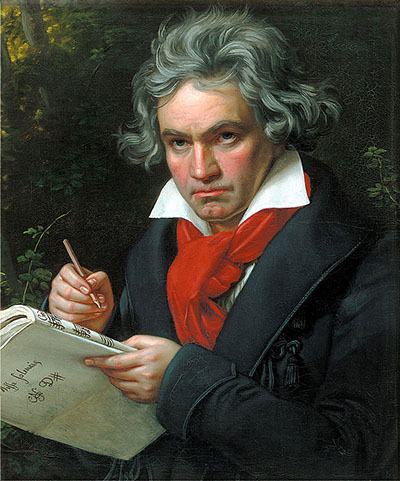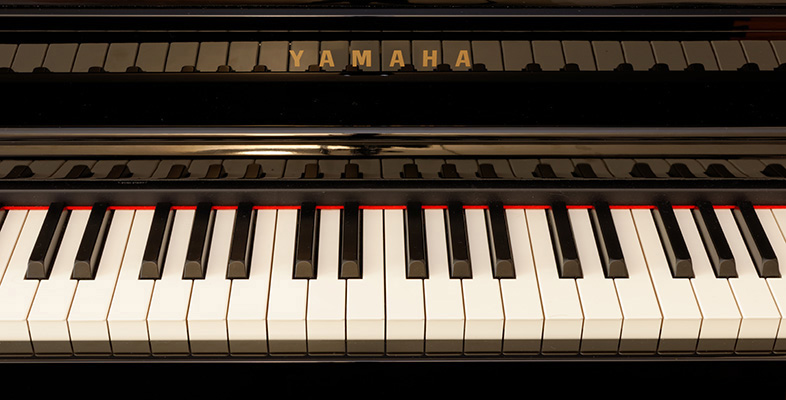 Ludwig van Beethoven: perhaps the most alluring, enigmatic and romantic of all composers. Living through major wars in Europe, he was the first composer who could be described as a ‘free agent’, composed glorious and enduring music, which he marketed to the full, is famous for his deafness and for his elaborate sketchbooks, as well as being a star pianist and teacher, courted by aristocratic women. He has been variously described as eccentric, alienated, imposing, amorous and morose.
Ludwig van Beethoven: perhaps the most alluring, enigmatic and romantic of all composers. Living through major wars in Europe, he was the first composer who could be described as a ‘free agent’, composed glorious and enduring music, which he marketed to the full, is famous for his deafness and for his elaborate sketchbooks, as well as being a star pianist and teacher, courted by aristocratic women. He has been variously described as eccentric, alienated, imposing, amorous and morose.
It is often said that Beethoven’s life and music divide into three clear periods, differentiated both by changes in musical style and by emotional crises. In his ‘first period’ Beethoven worked mainly as a virtuoso pianist. The second is marked by the shattering episode of the famous ‘Heiligenstadt Testament’, the third by a series of personal catastrophes.
Born in Bonn in 1770, Beethoven was the eldest child of a large family. His first music lessons were with his father, who is said to have been a harsh and cruel teacher. Despite this, Beethoven gave his first piano recital in Cologne at the age of 8. He continued with his studies, working as deputy court organist in Bonn at the age of 14 and then travelling to Vienna to give concerts in 1787, where he may have played to Mozart. In this year his mother died and his father’s alcohol problems worsened.
The most important event of the next few years was Beethoven’s departure from Bonn in 1792, again for Vienna, to study with the renowned composer Haydn.
Beethoven didn’t return home to Bonn, but instead stayed in Vienna, where various members of the nobility (such as Count Lobkowitz) sponsored him, keen to have their names associated with this new and exciting figure, as well as also feeding, clothing and housing him from time to time. His first public concert in Vienna took place in 1795, before travels across Europe the following year.
Soon there was a string of new and important works, including the Pathétique Sonata for piano and the First Symphony in 1800. It seemed as though all was well, but in 1801 Beethoven first noted that he was noticing some hearing loss. All the same, this was one of his most prolific years, with many new works, such as a Second Symphony, the Moonlight Sonata and chamber music.
In 1802 Beethoven wrote his famous Heiligenstadt Testament, a letter addressed to his brothers about the onset of deafness, in which he considers and then rejects suicide as a solution, saying that ‘it seemed to me impossible to leave the world until I had brought forth all that I felt was within me’. The music after this point is sometimes described as ‘heroic’ in style, and it is true that the works from 1803 are dramatic, monumental pieces, including the famous Eroica Symphony, initially dedicated to Napoleon, Fourth Piano Concerto and a Violin Concerto.
The announcement that Napoleon had crowned himself Emperor in 1804 saw Beethoven destroying the title page of the Eroica symphony and beginning work on a new (his only) opera, Fidelio, a work based on a story of devotion and heroism. A nephew, Karl, was born in 1806. He was to become very significant in Beethoven’s life.
Perhaps the most famous of all Beethoven’s works is the Fifth Symphony, completed in 1808, a year of intensive work and the production of the Choral Fantasia and the Sixth Pastoral Symphony in addition.
Unlike his teacher Haydn, Beethoven was never a paid servant, and in 1809 a group of Viennese noblemen: Archduke Rudolph and the Princes Lobkowitz and Kinsky, settled an annuity on him, giving him a secure income, very useful given that Vienna was invaded by the French that same year.
One of the features of the ‘third period’ of Beethoven’s life was the episode of a passionate and prolonged affair with a married woman. Who this was remains a mystery, though one likely candidate was a certain Antonie Brentano, whom he met first in 1810. A letter from 1812 is addressed to his ‘Immortal Beloved’, suggesting that Beethoven is considering ending the relationship. Despite emotional turbulence Beethoven completed his Seventh and Eighth symphonies in 1812.
In 1815 another momentous life event took place. Beethoven’s brother Carl died, naming as joint guardians of his son Karl, Ludwig and the child’s mother, Johanna. Bitter legal struggles between the two ensued, with Beethoven taking charge of his nephew the following year. The battle for custody rumbled on for several years, Karl returned to his mother in 1819 and then back to the composer in 1820. Against this backdrop Beethoven also suffered a series of illnesses, and by 1818 was completely deaf. From this date he began to use ‘conversation books’, which can still be seen and read.
Two big works were completed in time for performance in 1824: the Missa Solemnis and the Ninth Symphony, famous for its Ode to Joy in the last movement. There were no more symphonies after this date, and instead Beethoven focused his energies on daring and innovative string quartets. 1826 was another traumatic year, with several serious illnesses and Karl’s attempted suicide. In 1827 Beethoven died, mourned openly with a huge public funeral service in Vienna.
There is no other composer who has been so quoted, imagined, written about or painted, often with the Romanticized image of the unruly hair, stern gaze and furrowed brow, and no other composer who has so often been used politically, adopted both by Marxists and by fascists. More recently his music has been performed in venues as a symbol of international humanitarianism. Most importantly, Beethoven left a legacy of truly wonderful musical works.
Explore music in more detail


Rate and Review
Rate this article
Review this article
Log into OpenLearn to leave reviews and join in the conversation.
Article reviews